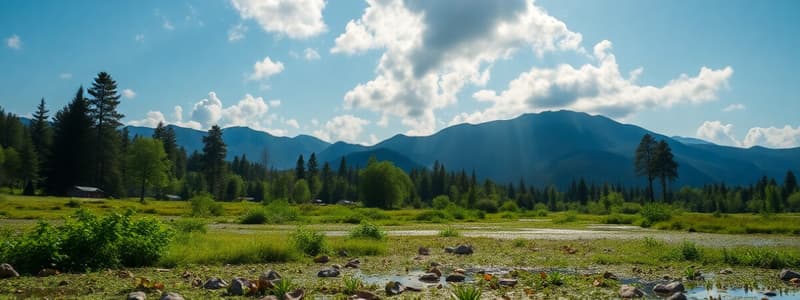Podcast
Questions and Answers
Which term best describes the collective beliefs, values, and practices that influence human behavior and interaction with the environment?
Which term best describes the collective beliefs, values, and practices that influence human behavior and interaction with the environment?
- Culture (correct)
- Stewardship
- Environmentalism
- Environmental Ethics
What is the primary difference between renewable and nonrenewable resources?
What is the primary difference between renewable and nonrenewable resources?
- Nonrenewable resources can be replenished if managed correctly.
- Renewable resources are finite, while nonrenewable resources are not.
- Renewable resources cannot be used for energy production.
- Renewable resources replenish naturally over short periods, while nonrenewable resources form slowly. (correct)
Which worldview emphasizes the importance of all living organisms and their well-being?
Which worldview emphasizes the importance of all living organisms and their well-being?
- Anthropocentric
- Biocentric (correct)
- Ecocentric
- Utilitarian
In environmental science, what is the term for managing natural resources to ensure their long-term sustainability?
In environmental science, what is the term for managing natural resources to ensure their long-term sustainability?
What characterizes an ecocentric worldview?
What characterizes an ecocentric worldview?
What does an ecological footprint measure?
What does an ecological footprint measure?
Which of the following best defines environmental ethics?
Which of the following best defines environmental ethics?
What significant societal shift is characterized by increased energy use and resource demand?
What significant societal shift is characterized by increased energy use and resource demand?
What is the primary purpose of a control in an experiment?
What is the primary purpose of a control in an experiment?
In which type of experiment are both researchers and participants unaware of group assignments?
In which type of experiment are both researchers and participants unaware of group assignments?
What best describes the independent variable in an experiment testing the effect of fertilizer on plant growth?
What best describes the independent variable in an experiment testing the effect of fertilizer on plant growth?
Which of the following statements is true regarding correlation?
Which of the following statements is true regarding correlation?
In the context of environmental science, what distinguishes it from environmentalism?
In the context of environmental science, what distinguishes it from environmentalism?
What might be a consequence of experimental bias in research?
What might be a consequence of experimental bias in research?
What is a characteristic of a natural experiment?
What is a characteristic of a natural experiment?
Which of the following is NOT a requirement for life?
Which of the following is NOT a requirement for life?
What is bioremediation primarily used for?
What is bioremediation primarily used for?
Which of the following correctly describes the Second Law of Thermodynamics?
Which of the following correctly describes the Second Law of Thermodynamics?
Which equation represents the process of cellular respiration?
Which equation represents the process of cellular respiration?
What type of energy is stored in chemical bonds?
What type of energy is stored in chemical bonds?
Which statement correctly describes a characteristic of water?
Which statement correctly describes a characteristic of water?
What is the main product of photosynthesis?
What is the main product of photosynthesis?
Which term describes the layer of gases surrounding Earth?
Which term describes the layer of gases surrounding Earth?
What is a key feature of hydrothermal vent producers?
What is a key feature of hydrothermal vent producers?
What is the primary focus of preservation in environmental management?
What is the primary focus of preservation in environmental management?
Which revolution is characterized by a shift to fossil fuels and industrial processes?
Which revolution is characterized by a shift to fossil fuels and industrial processes?
What does the 'Tragedy of the Commons' illustrate?
What does the 'Tragedy of the Commons' illustrate?
Which type of reaction absorbs energy from its surroundings?
Which type of reaction absorbs energy from its surroundings?
What aspect does ecocentric worldview prioritize over anthropocentric views?
What aspect does ecocentric worldview prioritize over anthropocentric views?
What fundamental principle does the Law of Conservation of Matter express?
What fundamental principle does the Law of Conservation of Matter express?
Which best describes the difference between science and pseudoscience?
Which best describes the difference between science and pseudoscience?
What is the outcome of resource overuse as illustrated by the Easter Island case study?
What is the outcome of resource overuse as illustrated by the Easter Island case study?
Which layer of Earth is composed mainly of iron and nickel?
Which layer of Earth is composed mainly of iron and nickel?
What process occurs at a divergent boundary?
What process occurs at a divergent boundary?
What is formed by the process of subduction?
What is formed by the process of subduction?
Which type of rock is formed from the cooling of magma or lava?
Which type of rock is formed from the cooling of magma or lava?
What is a characteristic of the asthenosphere?
What is a characteristic of the asthenosphere?
Which of the following processes is associated with the rock cycle?
Which of the following processes is associated with the rock cycle?
What causes a tsunami?
What causes a tsunami?
What is the definition of a rift?
What is the definition of a rift?
What geological activity is primarily associated with convergent boundaries?
What geological activity is primarily associated with convergent boundaries?
Which atmospheric layer contains the ozone layer that absorbs UV radiation?
Which atmospheric layer contains the ozone layer that absorbs UV radiation?
What is the main cause of tsunamis?
What is the main cause of tsunamis?
What does the Richter scale measure?
What does the Richter scale measure?
Which atmospheric layer is the coldest and where meteors burn up?
Which atmospheric layer is the coldest and where meteors burn up?
Which process is associated with the dissolution of calcium carbonate in limestone?
Which process is associated with the dissolution of calcium carbonate in limestone?
What would be a consequence of deforestation on mass wasting?
What would be a consequence of deforestation on mass wasting?
What is relative humidity?
What is relative humidity?
Flashcards
Environment
Environment
The sum of all living (biotic) and non-living (abiotic) factors that affect an organism or ecological system.
Biotic Factor
Biotic Factor
Any living component of an ecosystem, such as plants, animals, and bacteria.
Abiotic Factor
Abiotic Factor
Any non-living component of an ecosystem, such as sunlight, temperature, and water.
Environmental Science
Environmental Science
Signup and view all the flashcards
Environmentalism
Environmentalism
Signup and view all the flashcards
Stewardship
Stewardship
Signup and view all the flashcards
Biocentric
Biocentric
Signup and view all the flashcards
Ecocentric
Ecocentric
Signup and view all the flashcards
Controlled Experiment
Controlled Experiment
Signup and view all the flashcards
Control Group
Control Group
Signup and view all the flashcards
Natural Experiment
Natural Experiment
Signup and view all the flashcards
Laboratory Experiment
Laboratory Experiment
Signup and view all the flashcards
Field Experiment
Field Experiment
Signup and view all the flashcards
Blind Experiment
Blind Experiment
Signup and view all the flashcards
Double-Blind Experiment
Double-Blind Experiment
Signup and view all the flashcards
Experimental Bias
Experimental Bias
Signup and view all the flashcards
What is a community (ecology)?
What is a community (ecology)?
Signup and view all the flashcards
What is bioremediation?
What is bioremediation?
Signup and view all the flashcards
What is an ecosystem?
What is an ecosystem?
Signup and view all the flashcards
What is energy?
What is energy?
Signup and view all the flashcards
What is work (physics)?
What is work (physics)?
Signup and view all the flashcards
What is kinetic energy?
What is kinetic energy?
Signup and view all the flashcards
What is potential energy?
What is potential energy?
Signup and view all the flashcards
What is chemical energy?
What is chemical energy?
Signup and view all the flashcards
Ecology
Ecology
Signup and view all the flashcards
Chemical Reaction
Chemical Reaction
Signup and view all the flashcards
Organic Compound
Organic Compound
Signup and view all the flashcards
Metabolism
Metabolism
Signup and view all the flashcards
Population
Population
Signup and view all the flashcards
Preservation
Preservation
Signup and view all the flashcards
Conservation
Conservation
Signup and view all the flashcards
Tragedy of the Commons
Tragedy of the Commons
Signup and view all the flashcards
What is the Lithosphere?
What is the Lithosphere?
Signup and view all the flashcards
What are Convection Currents?
What are Convection Currents?
Signup and view all the flashcards
What are Tectonic plates?
What are Tectonic plates?
Signup and view all the flashcards
What is a Divergent boundary?
What is a Divergent boundary?
Signup and view all the flashcards
what is a Convergent boundary?
what is a Convergent boundary?
Signup and view all the flashcards
What is a Transform boundary?
What is a Transform boundary?
Signup and view all the flashcards
What is Magma?
What is Magma?
Signup and view all the flashcards
What is Subduction?
What is Subduction?
Signup and view all the flashcards
Troposphere
Troposphere
Signup and view all the flashcards
Tropopause
Tropopause
Signup and view all the flashcards
Atmosphere
Atmosphere
Signup and view all the flashcards
Stratosphere
Stratosphere
Signup and view all the flashcards
Climate
Climate
Signup and view all the flashcards
Weather
Weather
Signup and view all the flashcards
Atmospheric Pressure
Atmospheric Pressure
Signup and view all the flashcards
Relative Humidity
Relative Humidity
Signup and view all the flashcards
Study Notes
Environmental Science Key Terms
- Environment: The sum of all biotic (living) and abiotic (non-living) factors affecting an organism or ecological system.
- Biotic Factor: Any living component of an ecosystem (e.g., plants, animals, bacteria).
- Abiotic Factor: Any non-living component of an ecosystem (e.g., sunlight, temperature, water).
- Environmental Science: The interdisciplinary study of how humans interact with the environment.
- Environmentalism: A social movement aimed at protecting the natural world.
- Culture: Collective beliefs, values, and practices influencing human behavior and environment interaction.
- Stewardship: Responsible management and care for the environment.
- Anthropocentric: A worldview that prioritizes humans as the central element of existence.
- Biocentric: A worldview that values all living organisms.
- Ecocentric: A worldview that values entire ecosystems, encompassing both living and non-living components.
- Utilitarian: Emphasizes the practical and economic benefits of resources.
- Preservation: Protecting the environment from human interference.
- Conservation: Managing natural resources for long-term sustainability.
- Environmental Ethics: Moral principles guiding human interaction with the environment.
- Renewable Resource: A resource replenished naturally over short periods (e.g., sunlight, wind).
- Nonrenewable Resource: A resource that forms slowly and is finite (e.g., fossil fuels, minerals).
- Nomadic Lifestyle: A way of life characterized by frequent movement in search of resources.
- Agricultural Revolution: The shift from nomadic lifestyles to settled farming, increasing resource use.
- Industrial Revolution: A period of industrialization greatly increasing energy and resource demand.
- Consumption: The use of goods and resources by individuals or societies.
- Ecological Footprint: A measure of human demand on Earth's ecosystems.
- Independent Variable: The variable manipulated in an experiment.
- Dependent Variable: The variable measured in an experiment.
- Qualitative Data: Non-numerical data describing qualities or characteristics.
- Quantitative Data: Numerical data describing quantities or measurements.
- Manipulative Experiment: An experiment where the researcher actively changes the independent variable.
- Controlled Experiment: An experiment with a control group and experimental group(s) to isolate variables.
- Control: A baseline in an experiment used for comparison.
- Natural Experiment: Observation of natural events without manipulation by researchers.
- Laboratory Experiment: Experiments conducted in a controlled indoor environment.
- Field Experiment: Experiments conducted in natural settings.
- Blind Experiment: Participants unaware of group assignments to prevent bias.
- Double-Blind Experiment: Participants and researchers unaware of group assignments to eliminate bias.
- Experimental Bias: When researchers' expectations influence results.
- Correlation: A relationship between two variables that does not imply causation.
- Model: A simplified representation of a system or phenomenon.
- Peer Review: Evaluation of scientific work by other experts.
- Skepticism: Questioning and critically evaluating scientific claims.
- Environmental Justice: Fair distribution of environmental benefits and burdens.
Key Concepts and Explanations
- Biotic and Abiotic Factors: Examples of biotic factors in a forest include trees, deer, and fungi; abiotic factors include sunlight, soil, and water.
- Goals of Environmental Science vs. Environmentalism: Environmental science uses data and research to understand interactions and solve problems, whereas environmentalism advocates for protecting nature on ethical and moral grounds.
- Interdisciplinary Nature of Environmental Science: Combines biology, chemistry, physics, geology, and social sciences to address environmental issues.
- Requirements for Life: Organisms require energy (sunlight), nutrients, water, and suitable temperature ranges.
- Exxon Valdez Oil Spill: A significant environmental disaster involving an oil tanker spill in 1989.
- Scientific Method: Observation, hypothesis formation, experimentation, data analysis, and conclusion.
- Variables in Experiments: Independent variable (e.g., fertilizer type), dependent variable (e.g., plant height).
- Control and Experiment Types: Control trials (no fertilizer) ensure results are due to the independent variable.
- Culture and Worldview: Western cultures may prioritize economic growth, while indigenous cultures may focus on harmony with nature.
- Preservation vs. Conservation: Preservation focuses on keeping untouched areas, while conservation emphasizes sustainable resource management.
- Tragedy of the Commons: Overuse of shared resources, illustrated by overfishing in the oceans.
- Easter Island Case Study: An example of societal collapse due to resource depletion.
- Ecological footprint: A measure of human impact on Earth's resources and capacity to absorb waste, determined by consumption.
- Science vs. Pseudoscience: Science relies on empirical evidence and peer review; pseudoscience lacks rigorous evaluation.
Studying That Suits You
Use AI to generate personalized quizzes and flashcards to suit your learning preferences.




